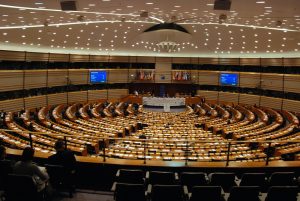The European Parliament has voted to support Myanmar’s shadow National Unity Government (NUG) and its parliamentary committee as the legitimate representatives of crisis-hit Myanmar.
In a resolution adopted late last week, the European Parliament expressed its “support for the people of Myanmar in their struggle for democracy, freedom, and human rights.” It said that it “supports the CRPH [Committee Representing Pyidaungsu Hluttaw] and the NUG as the only legitimate representatives of the democratic wishes of the people of Myanmar” and called on the Association of Southeast Asian Nations (ASEAN) and other foreign governments “to include and involve them in genuine and inclusive political dialogue and efforts aimed at the peaceful resolution of the crisis.”
Myanmar has been in a state of severe crisis since the coup, which immediately prompted a nationwide movement of protests and work stoppages, which have been complemented in recent months by growing armed resistance.
According to The Irrawaddy, the European Parliament motion, which passed with 647 votes in favor, two against, and 31 abstentions, makes it the first foreign legislature to recognize the CRPH, a body formed by ousted National League for Democracy (NLD) lawmakers, and the NUG, which was formed in April by the CRPH and its various allies.
The parliament’s motion condemned the coup, the fierce internal counterinsurgency operations that the military has waged to defend it, and requested that the European Council continue to impose “targeted and robust sanctions” against Sen. Gen. Min Aung Hlaing and his junta. In particular, it recommended that EU member states impose sanctions on any state-run Myanmar businesses, including the state-owned Myanmar Oil and Gas Enterprise, which generates the junta’s single largest source of foreign currency.
The European Parliament motion came a few days after Representative Gregory W. Meeks (D-NY) introduced the awkwardly named Burma Unified Through Rigorous Military Accountability (BURMA) Act of 2021 into the House of Representatives. Cosponsored by Representative Steve Chabot (R-OH) and Senator Benjamin L. Cardin (D-MD), the bill aims “to support and protect the Burmese people and send a clear signal to the Burmese military.”
If passed, the Act would authorize the imposition of more sanctions on individuals and entities linked to the coup, and authorize the creation of a Special Coordinator for Burmese Democracy at the State Department “to promote an international effort to impose and enforce multilateral sanctions on Burma and coordinate United States Government interagency efforts on Burma.”
The EU Parliament’s show of support represents a setback to the military administration’s attempt to gain international recognition as the country’s rightful caretaker government. Matthew Smith of the group Fortify Rights described the move as “a blow to the criminal Myanmar junta.”
At the same time, it’s unlikely that Sen. Gen. Min Aung Hlaing and his cloistered clique of senior junta officials held out much hope of recognition by the European Parliament, which has been active on human rights questions since the 1970s.
While the European Parliament’s motion of support is an important step for the NUG, the parliament is able to make such a move precisely because it has no need to weigh the consequences of actually making the decision itself. For the European Commission to extend a similar recognition to the NUG would necessarily imply the derecognition of the military junta and likely result in the closure of its mission in Yangon. The same would go for EU member states and any other foreign government that chose formally to recognize the NUG as the country’s legitimate government.
Moreover, to switch recognition to the opposition forces would seem to carry a responsibility to offer more than rhetorical support for the NUG’s current political and armed struggle against the junta. For better or worse, this is a step that no Western government is yet willing to take.
As it stands, most have avoided “taking a side” in Myanmar’s crisis in order to keep their options open and perhaps to prevent the nation’s fate becoming tangled up in strategic tensions between China and the Western democracies. While Myanmar activists have rightly pointed out that engaging with the junta in any way also involves taking a side – the wrong one – the ambiguity of the present status quo, in which foreign governments maintain embassies in Yangon or Naypyidaw without extending formal recognition of the coup government, currently stands out as the least risky of the available options.
As long as the United Nations General Assembly is yet to resolve the vexed question of who should hold Myanmar’s U.N. seat, a decision that it recently deferred until the end of its annual session next month, Western governments will likely extend their support to the NUG through less direct and formal means.
































